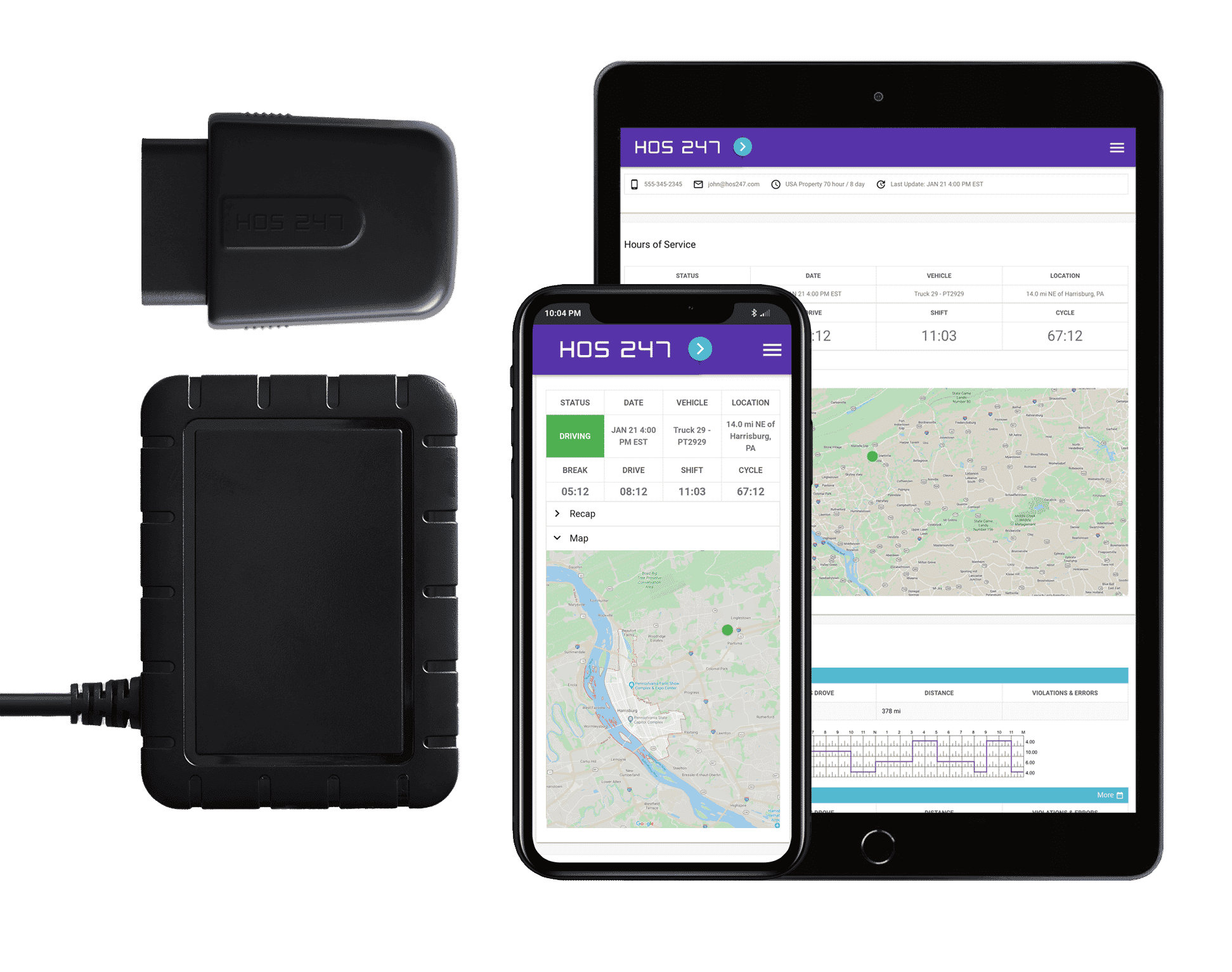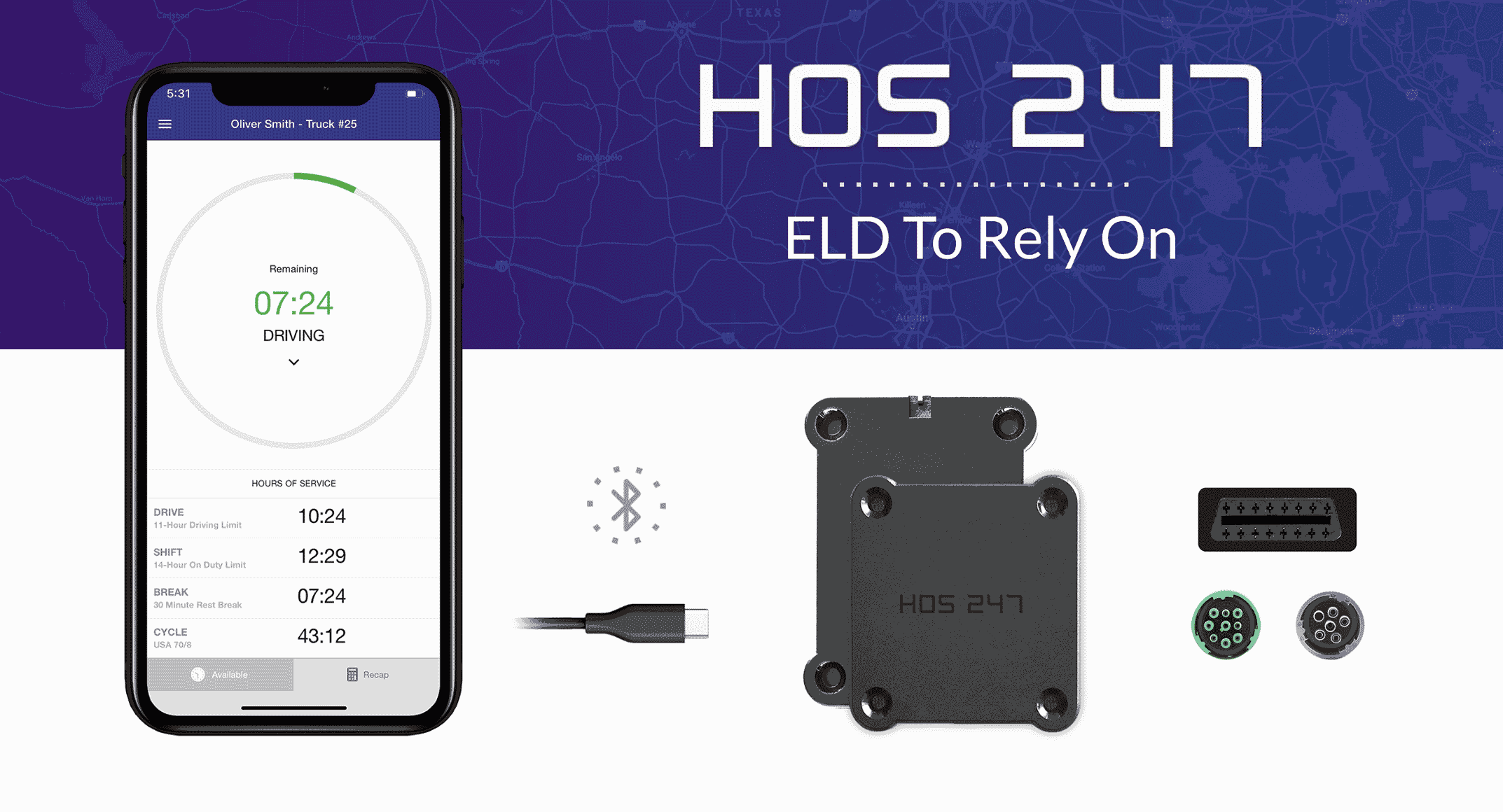GPS tracking is one of the most valuable features an ELD solution can offer. Carriers that implement this technology can benefit from cost savings and increased safety. Customer satisfaction can also be enhanced thanks to more efficient fleet management. This article will discuss choosing the right fleet GPS tracking system for your fleet and how exactly it can improve your business’s performance.
Do you have any questions? Talk to ELD Advisor: 650-405-3372 or Request Callback
How to Choose a GPS Fleet Tracking System
There are many factors to take into consideration when picking a GPS tracking system. If your fleet engages in interstate commerce, the first thing to look at might be an electronic logging system that includes GPS tracking; that way, you can work with a single provider—and your staff will only have to learn to use one system—to achieve ELD compliance and improve fleet visibility. Apart from an electronic logbook, here are some qualities to look for in a GPS tracker:
- Hardware that is compatible with your vehicles. If your fleet is composed of trailers as well as light- and medium-duty trucks, it would be convenient to look for a device that can be installed in all of them.
- Easy installation. If the hardware requires special installation, this means downtime and probably an extra fee. Look for a device with quick and straightforward installation.

- Real-time tracking. Some GPS trackers give fleet managers periodic updates on the vehicle’s location. They might receive the data once a day or set shorter intervals. In general, real-time trackers provide more security and can help dispatchers reduce their workload.
- Efficient technical support. The right fleet GPS tracking system will be backed up by a strong customer support team. The provider can and should help you implement the GPS tracker so your company can get the most out of it and optimize fleet performance. They must also be able to help you troubleshoot should you need it.
- Ease of use. User-friendly software is an important component of a GPS system. The technology these devices use is complex; however, users must be able to manage it seamlessly. An intuitive fleet manager portal is key to the successful implementation of these systems.
- 4G technology. Most providers will shut down their 3G network in 2022. Choosing a device that integrates 4G can save you time and inconveniences in the future, plus the technology is more efficient.
- Demo or trial period. When looking for a GPS fleet tracking system cost is important. However, making sure the system is right for your trucking business comes first. Ask potential providers for a demo or trial and test the device’s performance before committing to anything. That way, you will know if the investment is worth it.
Benefits of the HOS247 4G Fleet GPS Tracking System
HOS247 has been working hand in hand with trucking businesses providing accessible, high-quality ELD and fleet management services. Top-rated customer service is a staple of the team, several other benefits bring additional value to our clients. Our fleet GPS tracking system has the following advantages:
- Cost savings. HOS247 GPS tracking provides insights that decrease costs significantly. On the one hand, idling monitoring allows fleet managers to improve fuel expenses by implementing strategies to reduce drivers’ idling. On the other hand, this technology gives fleet managers better control of assets. With GPS tracking, alerts are received if a vehicle is driven to unauthorized locations. Tracking devices help recover stolen vehicles, preventing massive losses.
- Ease of use. The HOS247 fleet GPS tracking system uses software that can be installed from your internet browser just like a standard program. Fleet managers can log in, and the user-friendly interface will be ready for use.
- Quick and simple installation. The 4G GPS tracker is small and can be installed by the driver—no need for a technician or to pay extra fees.
- Visibility for fleets and deliveries. GPS programs allow fleet managers to see the exact location of the vehicles, helping dispatchers be more efficient when assigning loads and finding the quickest routes. The GPS tracker will also serve as a tool of accountability since it can show details of the services performed and the truck’s course during their operations.
- Timely maintenance. Fleet managers are also notified when the vehicles need maintenance, preventing breakdowns and improving compliance with safety regulations. It also contributes to lengthening your trucks’ useful life.

HOS247 Offers a Comprehensive ELD Solution with GPS Tracking
HOS247 is an FMCSA-approved ELD provider that appreciates the added value that elog solutions can bring to the table. HOS247 goes beyond the basics and offers the following benefits to truckers:
- Reliable hardware. The elog and GPS hardware have been tried and put to the test to ensure optimal performance. Installation is quick and easy to get things up and running in a few minutes.
- Premium customer services. Our technical support team is available seven days a week, ready to help users with any issue and in four languages: English, Polish, Russian, and Spanish. The reps are knowledgeable and will call you back if the call drops.
- Trial period. Customers deserve to know what they are buying. Try HOS247 ELD with GPS for two weeks, check out the features, and get familiar with the system. You can return it within that period if you choose to and receive a hassle-free refund.
- No contract policy. HOS247 offers flexible plans that can be upgraded or downgraded as the customer sees fit. Since it works as a subscription service, users may choose to have monthly or yearly plans.
- All around user-friendly solutions. The HOS247 app has been crafted to be intuitive and easy to learn. Drivers are practical professionals; they appreciate systems that get them from point A to B as quickly as possible.
- Extra features. Apart from GPS tracking, we offer a roster of additional features to complement our logbook system:
- Vehicle diagnostics.
- Fault code detection.
- Idling monitoring.
- IFTA mileage calculations.
About the ELD Mandate
Since December 2019, commercial bus and truck drivers and carriers required to log RODS are subject to the ELD mandate in the United States. The main objective is to improve safety for drivers and the public while on the road. The rule includes drivers living in Canada and Mexico. That said, the mandate allows specific exceptions:
- Short-haul drivers. They may continue to use timecards; since they are not required to keep RODS, they will not be required to use electronic logbooks.
- RODS kept for less than 8/30 days. Drivers who use paper RODS for 8 days or less out of 30 days are exempt.
- Drive-away-tow-away operations. When delivering trucks as part of the cargo, drivers may operate without an elog.
- Vehicles with engines manufactured before 2000. These vehicles do not have ECM ports, so they are not required to install electronic logging devices.
HOS247 seeks to become a partner for our customers to improve their operations. HOS247 electronic logbooks are compliant with FMCSA standards. They are designed to help prevent DOT violations so truckers can focus on growing their business with fleet management tools such as fleet GPS tracking.

I’ve co-founded, built and managed several transportation-related businesses. Now, I’m a founder and CEO of HOS247 – an AI Transportation Platform for trucking companies, freight brokers and other logistics operations. We are transitioning old-style operations to technology-advanced logistics entities and help them to grow their businesses. ELDs (electronic logging devices), fleet tracking and management 2.0 combined with AI-powered dispatch tools.












When it comes to maintaining a trucking company, every business owner needs to ensure that they have the best equipment and software available. Finding out which companies both meet and exceed industry standards can help business owners to make a

Truck drivers must comply with a series of rules and requirements set by the FMCSA. One such requirement is the use of a truck log book to record drivers’ hours of service when operating commercial motor vehicles for interstate trade

Trucking businesses rely on ELD providers to stay DOT compliant. That is why choosing a reputable company with an efficient electronic log book for sale is so important. HOS247 offers an advanced elog solution that is FMCSA compliant, dependable, and